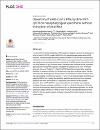Detection of SARS-CoV-2 RNA by direct RT-qPCR on nasopharyngeal specimens without extraction of viral RNA.
| Author | Hasan, Mohammad Rubayet |
| Author | Mirza, Faheem |
| Author | Al-Hail, Hamad |
| Author | Sundararaju, Sathyavathi |
| Author | Xaba, Thabisile |
| Author | Iqbal, Muhammad |
| Author | Alhussain, Hashim |
| Author | Yassine, Hadi Mohamad |
| Author | Perez-Lopez, Andres |
| Author | Tang, Patrick |
| Available date | 2020-08-30T05:20:31Z |
| Publication Date | 2020-07-24 |
| Publication Name | PLOS ONE |
| Identifier | http://dx.doi.org/10.1371/journal.pone.0236564 |
| Citation | Hasan MR, Mirza F, Al-Hail H, Sundararaju S, Xaba T, Iqbal M, et al. (2020) Detection of SARS-CoV-2 RNA by direct RT-qPCR on nasopharyngeal specimens without extraction of viral RNA. PLoS ONE 15(7): e0236564. https://doi.org/10.1371/journal.pone.0236564 |
| Abstract | To circumvent the limited availability of RNA extraction reagents, we aimed to develop a protocol for direct RT-qPCR to detect SARS-CoV-2 in nasopharyngeal swabs without RNA extraction. Nasopharyngeal specimens positive for SARS-CoV-2 and other coronaviruses collected in universal viral transport (UVT) medium were pre-processed by several commercial and laboratory-developed methods and tested by RT-qPCR assays without RNA extraction using different RT-qPCR master mixes. The results were compared to that of standard approach that involves RNA extraction. Incubation of specimens at 65°C for 10 minutes along with the use of TaqPath™ 1-Step RT-qPCR Master Mix provides higher analytical sensitivity for detection of SARS-CoV-2 RNA than many other conditions tested. The optimized direct RT-qPCR approach demonstrated a limit of detection of 6.6x103 copy/ml and high reproducibility (co-efficient of variation = 1.2%). In 132 nasopharyngeal specimens submitted for SARS-CoV-2 testing, the sensitivity, specificity and accuracy of our optimized approach were 95%, 99% and 98.5%, respectively, with reference to the standard approach. Also, the RT-qPCR CT values obtained by the two methods were positively correlated (Pearson correlation coefficient r = 0.6971, p = 0.0013). The rate of PCR inhibition by the direct approach was 8% compared to 9% by the standard approach. Our simple approach to detect SARS-CoV-2 RNA by direct RT-qPCR may help laboratories continue testing for the virus despite reagent shortages or expand their testing capacity in resource limited settings. |
| Language | en |
| Publisher | Public Library of Science |
| Subject | SARS-CoV-2 Betacoronavirus Clinical Laboratory Techniques/methods Coronavirus Infections/diagnosis Humans Nasopharynx/virology Pandemics |
| Type | Article |
| Issue Number | 7 |
| Volume Number | 15 |
| ESSN | 1932-6203 |
Files in this item
This item appears in the following Collection(s)
-
Biomedical Research Center Research [840 items ]
-
COVID-19 Research [853 items ]


